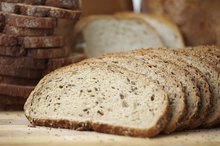What does fact checked mean?
At Healthfully, we strive to deliver objective content that is accurate and up-to-date. Our team periodically reviews articles in order to ensure content quality. The sources cited below consist of evidence from peer-reviewed journals, prominent medical organizations, academic associations, and government data.
The information contained on this site is for informational purposes only, and should not be used as a substitute for the advice of a professional health care provider. Please check with the appropriate physician regarding health questions and concerns. Although we strive to deliver accurate and up-to-date information, no guarantee to that effect is made.
The Best Gestational Diabetes Meal Plan
Making smart diet choices is important for all pregnant women, but it's especially important for women diagnosed with gestational diabetes mellitus or GDM 13. Gestational diabetes is condition that causes high blood sugar during pregnancy 13. The goal of your diet is to help you keep your blood sugar within normal range to promote a healthy pregnancy and baby. Consult a dietitian to discuss your gestational diabetic diet 3.
Start With Calorie Needs
To be able to plan your diet, you need to know how many calories you require each day to promote a healthy weight gain. A 2013 article published in Today's Dietitian suggests women with gestational diabetes need about 2,000 calories to 2,500 calories a day to meet nutrient needs and promote appropriate weight gain 13. This is based on pregnancy calorie needs of 35 calories per kilogram of body weight.
Of course, calorie needs are different for everyone, and some women may benefit from a lower-calorie diet to help get better control of blood sugar. Your dietitian can help you determine your personal calorie needs to promote healthy weight gain while assisting in blood sugar control.
- To be able to plan your diet, you need to know how many calories you require each day to promote a healthy weight gain.
- A 2013 article published in Today's Dietitian suggests women with gestational diabetes need about 2,000 calories to 2,500 calories a day to meet nutrient needs and promote appropriate weight gain 1.
Control Those Carbs
Diabetic Diet Food List
Learn More
The most important part of your diet for gestational diabetes is controlling your carbohydrate intake because these foods have the greatest impact on blood sugar 13. Your dietitian can help you determine your daily carbohydrate needs, which may range from 35 percent to 40 percent of calories. For example, on a 2,200-calorie diet, 770 calories to 880 calories should come from carbs, or 192 grams to 220 grams of carbs a day. These carbs should be evenly distributed between three meals and two to three snacks.
Food labels and carb counting books can help you track your carb intake. In general, 1 cup of milk or yogurt, one small piece of fruit or 1/2 cup of cut fruit, one slice of bread, 1/3 cup of cooked pasta or rice, 1/2 cup of oatmeal or 1/2 cup of peas or potatoes equals 15 grams of carbohydrate.
- The most important part of your diet for gestational diabetes is controlling your carbohydrate intake because these foods have the greatest impact on blood sugar 1.
- For example, on a 2,200-calorie diet, 770 calories to 880 calories should come from carbs, or 192 grams to 220 grams of carbs a day.
Additional Diet Tips
Nonstarchy vegetables such as greens, cucumbers, peppers, broccoli and carrots are considered free foods and do not need to be counted or portioned.
Eat no more than three servings of fruit a day and avoid fruit juice. You should also limit sweets such as cake, cookies and candy. Blood sugar is difficult to manage at breakfast, and it is recommended you limit your carbs to two servings and avoid milk and fruit.
- Nonstarchy vegetables such as greens, cucumbers, peppers, broccoli and carrots are considered free foods and do not need to be counted or portioned.
- Blood sugar is difficult to manage at breakfast, and it is recommended you limit your carbs to two servings and avoid milk and fruit.
GDM Meal Plan
Gestational Diabetes Meal Ideas
Learn More
If you need 2,200 calories a day, a healthy breakfast for someone with gestational diabetes might include two slices of whole-wheat toast with 1 1/2 tablespoons of peanut butter and a glass of water 13. If you need a hot beverage such as coffee or tea in the morning, talk to your doctor about the healthiest options. This meal contains 360 calories and 30 grams of carbs.
For a midmorning snack, consider a container of nonfat sugar-free yogurt with a small apple and 1 ounce of cheese for 250 calories and 30 grams of carbs.
At lunch, enjoy a turkey sandwich with 3 ounces of turkey meat, 1 ounce of cheese on two slices of whole-wheat bread. Served with 1 cup of low-fat milk, mixed greens with balsamic vinaigrette and 3/4 cup of fresh blueberries. This meal contains 615 calories and 60 grams of carbs.
In the midafternoon, a healthy snack might include 3/4 cup of whole-grain unsweetened cold cereal with 1 cup of nonfat milk and a hard-boiled egg for 275 calories and 30 grams of carbs.
This meal contains 690 calories and 60 grams of carbs.
- If you need 2,200 calories a day, a healthy breakfast for someone with gestational diabetes might include two slices of whole-wheat toast with 1 1/2 tablespoons of peanut butter and a glass of water 1.
- In the midafternoon, a healthy snack might include 3/4 cup of whole-grain unsweetened cold cereal with 1 cup of nonfat milk and a hard-boiled egg for 275 calories and 30 grams of carbs.
Related Articles
References
- MedlinePlus: Diabetes Diet -- Gestational
- UCSF Medical Center: Dietary Recommendations for Gestational Diabetes
- Today's Dietitian: Gestational Diabetes
- American Diabetes Association: Carbohydrate Counting
- The University of Arkansas Division of Agriculture: The Exchange List System for Diabetic Meal Planning
- American Pregnancy Association: Caffeine Intake During Pregnancy
- Centers for Disease Control and Prevention. Diabetes and carbs. Updated September 19, 2019.
- Harvard T.H. Chan School of Public Health. Carbohydrates and blood sugar.
- American Diabetes Association. 5. Facilitating Behavior Change and Well-being to Improve Health Outcomes: Standards of Medical Care in Diabetes-2020. Diabetes Care. 2020;43(Suppl 1):S48-S65. doi:10.2337/dc20-S005
- EndocrineWeb. Treatment of diabetes: The diabetic diet. Updated April 2, 2019.
- American Diabetes Association. 6. Glycemic targets: Standards of medical care in diabetes-2020. Diabetes Care. 2020;43(Suppl 1):S66-S76. doi:10.2337/dc20-S006
- American Diabetes Association. Meal planning.
- Chang CR, Francois ME, Little JP. Restricting carbohydrates at breakfast is sufficient to reduce 24-hour exposure to postprandial hyperglycemia and improve glycemic variability. Am J Clin Nutr. 2019;109(5):1302-1309. doi:10.1093/ajcn/nqy261
- Harvard T.H. Chan School of Public Health. Sugary drinks.
- American Heart Association. Added sugars. Updated April 17, 2018.
- American Diabetes Association. Diabetes self-management education.
- dLife. Blood tests for diabetes: two-hour postprandial glucose test. Updated September 2017.
- Centers for Disease Control and Prevention. Diabetes and carbohydrates. 2019.
Writer Bio
Jill Corleone is a registered dietitian and health coach who has been writing and lecturing on diet and health for more than 15 years. Her work has been featured on the Huffington Post, Diabetes Self-Management and in the book "Noninvasive Mechanical Ventilation," edited by John R. Bach, M.D. Corleone holds a Bachelor of Science in nutrition.









